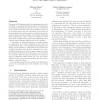Free Online Productivity Tools
i2Speak
i2Symbol
i2OCR
iTex2Img
iWeb2Print
iWeb2Shot
i2Type
iPdf2Split
iPdf2Merge
i2Bopomofo
i2Arabic
i2Style
i2Image
i2PDF
iLatex2Rtf
Sci2ools
132
click to vote
SIGMOD
2000
ACM
2000
ACM
Counting, Enumerating, and Sampling of Execution Plans in a Cost-Based Query Optimizer
Testing an SQL database system by running large sets of deterministic or stochastic SQL statements is common practice in commercial database development. However, code defects often remain undetected as the query optimizer’s choice of an execution plan is not only depending on the query but strongly influenced by a large number of parameters describing the database and the hardware environment. Modifying these parameters in order to steer the optimizer to select other plans is difficult since this means anticipating often complex search strategies implemented in the optimizer. In this paper we devise algorithms for counting, exhaustive generation, and uniform sampling of plans from the complete search space. Our techniques allow extensive validation of both generation of alternatives, and execution algorithms with plans other than the optimized one—if two candidate plans fail to produce the same results, then either the optimizer considered an invalid plan, or the execution code ...
Commercial Database Development | Database | Query Optimizer Choice | SIGMOD 2000 | Stochastic Sql Statements |
| Added | 01 Aug 2010 |
| Updated | 01 Aug 2010 |
| Type | Conference |
| Year | 2000 |
| Where | SIGMOD |
| Authors | Florian Waas, César A. Galindo-Legaria |
Comments (0)

